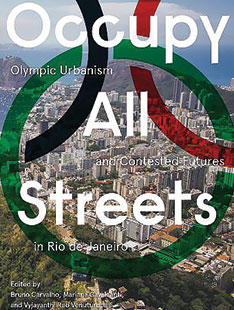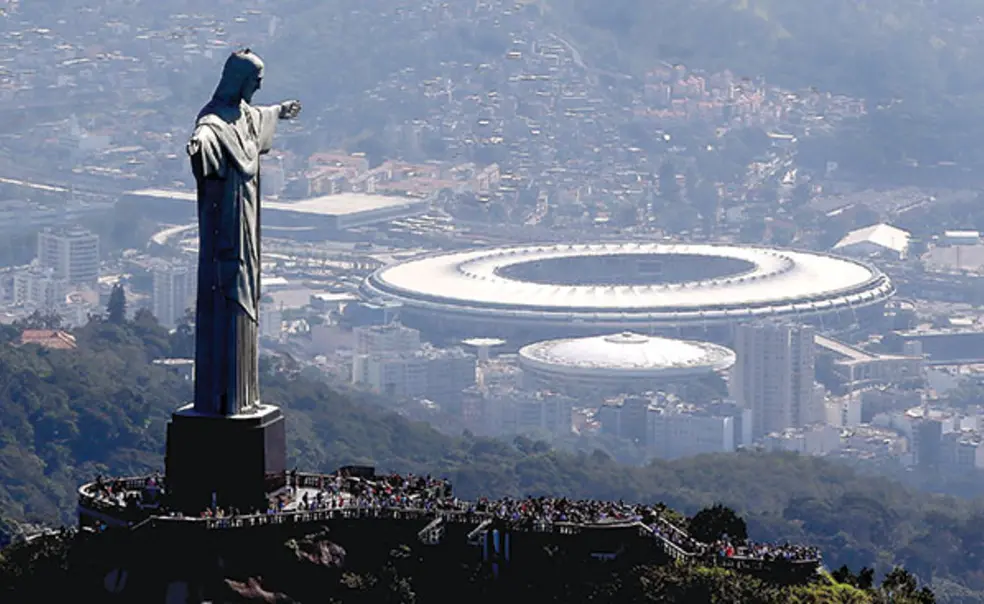When cities host huge global events, they become the site of big dreams — and big disagreements. Last year’s summer Olympics in Rio de Janeiro drew much criticism for large-scale development that displaced residents and exacerbated socioeconomic divides. It also spurred intense debate about what kind of city Rio should be. Those themes are explored in Occupy All Streets: Olympic Urbanism and Contested Futures (Terreform), co-edited by Rio native Bruno Carvalho, a professor in the Spanish and Portuguese department and co-director of the Princeton-Mellon Initiative in Architecture, Urbanism, and the Humanities. Carvalho spoke to PAW about last year’s Olympics and Rio’s past, present, and future.
In the book, you describe moments in history when different conceptions of Rio took hold. What were they?

We can think in terms of epithets: In the 1930s a Carnival song popularized Rio as the “Marvelous City,” and it became the city anthem in the 1960s. But the epithet had come about in the context of early 20th-century urban reforms that tried to reinvent Brazil in a more modern, elitist, Paris-inspired mold, and it excluded the majority of the city that didn’t conform to this image.
Another epithet, which became very dominant in the 1990s, is this idea of the “Divided City,” characterized by urban violence, political crisis, and a persistent socioeconomic abyss — symbolized by the favelas versus the upscale waterfront residential buildings. A more recent epithet, which City Hall tried to push in the last few years, is Rio as “Olympic City.”
That Olympic City idea, of Rio as a revitalized, global metropolis, didn’t stick. Why?
The legacy of the Olympics reinforces division in the city. Investments were not made where they were most needed. And a lot of the new infrastructure benefited real-estate developers and construction companies. There were forced removals of residents. The bulk of public investments benefited relatively few interests, as Olympics, in general, do.
The book is very critical toward the Olympics, but we made an effort to propose alternatives. There’s one essay by a planner named Guilherme Lassance — the starting point is: Look, this is not what any of us would have proposed, but now that this is where we are, how can we make the most of it? We tried to imagine better futures.
Rio is in a precarious state politically and economically; this is a moment of widespread pessimism. Those of us who study the past can find some consolation in the fact that any given present moment serves as irrefutable proof of the future’s unpredictability. For good or for bad, the city will surprise us yet again.
In general, public sentiment seems to be turning against mega-events as occasions for cities to reinvent themselves. What are some more appropriate platforms?
These events could, under a different model, be productive. Part of the answer is recognizing that metropolitan regions in many parts of the world now have populations the size of medium-sized European countries. So they’re not places we can wholesale transform and reinvent within a few years.
On other hand, we didn’t want the book to be another critique of top-down planning. Planners are hardly as powerful as they once were, and cities are complicated mechanisms where it’s hard to identify who has agency and how changes take place. So we need to do this combination of stepping back, try to think of broader scales, with all of their complexities and possibilities, and talk about things like mobility across municipal boundaries — and at the same time be able to zoom in and practice what has been called acupuncture urbanism, i.e., small-scale interventions like bike lanes.
Interview conducted and condensed by Eveline Chao ’02













No responses yet